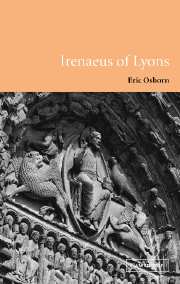Book contents
- Frontmatter
- Contents
- Preface
- List of abbreviations
- Chapter 1 Irenaeus: argument and imagery
- Part I DIVINE INTELLECT
- Part II ECONOMY
- Chapter 3 One creator: ut sapiens architectus et maximus rex
- Chapter 4 Economy: God as architect of time
- Part III RECAPITULATION
- Part IV PARTICIPATION
- Part V CONCLUSION
- Appendix: Gnosticism
- Select bibliography
- Citations from Irenaeus
- Citations from the bible
- Index of classical authors
- Index of patristic authors
- General index
Chapter 4 - Economy: God as architect of time
Published online by Cambridge University Press: 22 September 2009
- Frontmatter
- Contents
- Preface
- List of abbreviations
- Chapter 1 Irenaeus: argument and imagery
- Part I DIVINE INTELLECT
- Part II ECONOMY
- Chapter 3 One creator: ut sapiens architectus et maximus rex
- Chapter 4 Economy: God as architect of time
- Part III RECAPITULATION
- Part IV PARTICIPATION
- Part V CONCLUSION
- Appendix: Gnosticism
- Select bibliography
- Citations from Irenaeus
- Citations from the bible
- Index of classical authors
- Index of patristic authors
- General index
Summary
The divine economy is not an abstract composition. It is the way in which the wise architect and sovereign king disposed the salvation of mankind. This disposition reflects a firmer reality within the events which are scattered around and within it. This reality is nothing less than the mind of God, seen by the prophets, and Irenaeus' answer to Platonic forms or geometry. The pattern of the supreme disposer is not found in abstraction, but in the artistry of certain events woven together in time and place. It must not be confused with the narrower and less subtle concept of salvation as the mighty acts of God.
In Greek literature, the use of oikonomia (οἰκονομία) moved from domestic to political economy, from the management of a household to the management of a city (Aristotle, Politics 3.1285b). It became a common Hellenistic word for good administration or purposeful arrangement. Ephesians links it with the hidden divine purpose for the salvation of man (Eph. 1:9–12) and the realisation and revelation of that purpose (Eph. 3:2–11). Paul speaks of stewards, oikonomoi, who administered the mysteries of God (1 Cor. 4:1–2). The Stoics are the first to use oikonomia for God and the universe (SVF 2.945, 273). For them everything has purpose and place within a world of conflict and contradictions. Oikonomia produces sympatheia to facilitate life according to nature (SVF 3.582). Beyond theology and philosophy, oikonomia is an important word for architecture (Vitruvius, De arch. 1.2.1).
- Type
- Chapter
- Information
- Irenaeus of Lyons , pp. 74 - 94Publisher: Cambridge University PressPrint publication year: 2001

